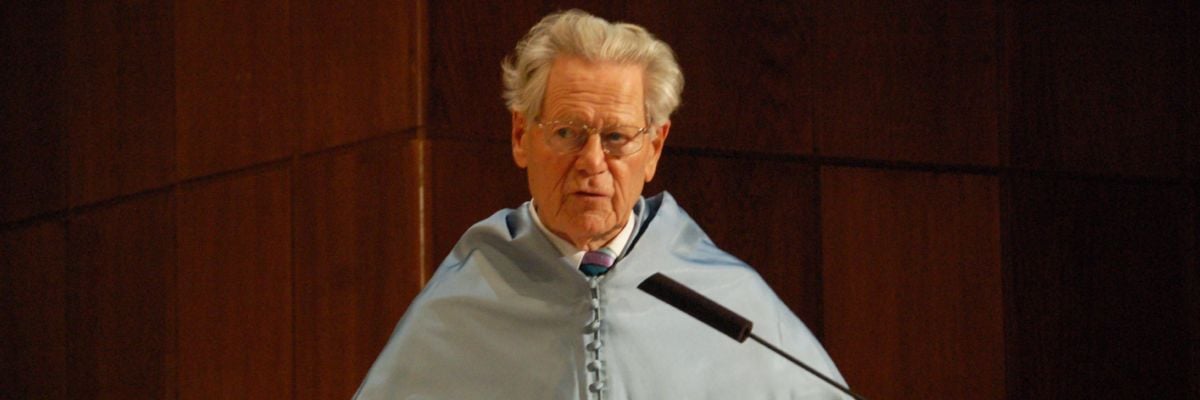
Last week marked the death of Hans Küng. For Catholics coming of age in the twenty-first century, the name might not ring a bell, but Küng was a major figure in his day: the onetime theologian’s dissident ideas were very popular, and they are widespread even now. Decades after the peak of his influence, you’ll find his legacy in seminaries, in homilies, and in religious education classes worldwide.
Küng, born in Sursee, Switzerland in 1928, first rose to international prominence during the Second Vatican Council (1962-1965). Afterward, he wrote a series of books in which he expressed views contrary to Catholic dogma and doctrine. This led to the Vatican stripping him of his role as a Catholic theologian in 1979.
A darling of liberal Catholics and a bane of conservatives, Küng had a complex, difficult, and sometimes surprisingly cordial relationship with representatives of the Magisterium.
Ordained to the priesthood in 1954, Küng published his doctoral dissertation, “Justification: The Doctrine of Karl Barth and a Catholic Reflection,” three years later. In it, he identified areas of agreement between Catholic teaching on justification and the thought of Protestant figures such as Swiss Reformed theologian Karl Barth. He concluded that Catholics and Protestants agree enough that the mutual Reformation-era condemnations on the subject should not divide the two communities.
This presaged the 1999 “Joint Declaration on the Doctrine of Justification,” initially signed by the Catholic Church and the Lutheran World Federation. (It was later signed by the World Methodist Council and the World Communion of Reformed Churches.)
In 1960, Küng was appointed a professor of the Catholic theological faculty at the University of Tübingen, Germany. Following Pope John XXII’s 1959 announcement of the Second Vatican Council, Küng released a book titled The Council, Reform, and Reunion, which was translated into multiple languages and became a bestseller. In 1963, he conducted a lecture tour of the United States, during which he met President John F. Kennedy, who hailed him as “a new frontier man of the Catholic Church.”
For the Council itself, Küng’s bishop—Carl Joseph Leiprecht of Rottenburg, Germany—asked him to serve as his personal peritus, or expert theological adviser. Then 34 years old, he was the youngest such expert to serve.
Küng’s fluency in multiple languages led him to become a public face for the council, and the press interviewed him frequently. Although he is sometimes credited as having a significant impact on the council, fellow former peritus Joseph Ratzinger (later Pope Benedict XVI) clarified in a 2016 interview that Küng had no actual role in drafting the council documents.
He did, however, have an influence on the course of events. In October 1964, Pope Paul VI appeared ready to postpone votes on draft documents dealing with Christian-Jewish relations and religious liberty so they could be further considered and possibly revised by officials of the Roman Curia. Küng worked with a group of cardinals to draft a letter of protest against this move, and—despite the secrecy requirement then in force—he phoned major newspapers to leak word of the behind-the-scenes actions. The resulting press sensation led to the drafts remaining before the bishops instead of being returned to the Curia.
In 1967, Küng published a new bestseller entitled The Church, and in 1971, he followed it with Infallible? An Inquiry. These volumes challenged Catholic dogma and doctrine on a number of points, leading him into conflict with the Magisterium.
The Sacred Congregation for the Doctrine of the Faith began corresponding with him and invited him to explain in writing how his views could be reconciled with Catholic teaching. It later invited him to explain his views personally, in Rome.
Küng declined these requests. As the National Catholic Reporter explains:
Küng stood his ground. He would not recant. He wanted to see the file the Vatican had amassed on him. He demanded a written list of the questions regarding his book as well as the names of those vetting the work. He asked to speak in German during any meetings with Vatican officials and further requested that the Vatican pay his travel expenses to Rome or else hold the hearings at Küng’s house in Tübingen.
In 1975, the Congregation released a document warning about two of his books. While noting a variety of problems with Küng’s recent books, it specifically called attention to three major ones:
- Contrary to Vatican I and II, Küng challenged the dogma of the Church’s infallibility, reducing it to “a certain basic indefectibility of the Church in matters of truth” that still allowed the Magisterium to be mistaken in matters that it had infallibly defined.
- Contrary to Vatican II, Küng did not adhere to the doctrine that the bishops are the authoritative Magisterium of the Church and that they alone have the task of authoritatively interpreting Scripture.
- Contrary to Lateran IV and Vatican II, Küng held that the Eucharist could be validly consecrated by laypeople, at least in cases of necessity.
Küng did not modify his views, and in 1979, the Congregation published a new declaration announcing that he “can no longer be considered a Catholic theologian nor function as such in a teaching role.”
This resulted in Küng leaving the theological faculty of Tübingen, though he remained on the faculty of the university’s ecumenical institute, which he had founded.
Küng wrote about these experiences in his memoirs. According to the National Catholic Reporter:
Küng spent 80 pages reviewing charges against him—secret meetings by German bishops and Vatican officials outside of Germany, betrayal by seven of his 11 Tübingen colleagues and a near physical and emotional breakdown caused by exhaustion from his efforts to answer Vatican accusations while preserving his place in a state university.
Over time, Küng also called into question other dogmas, including the divinity of Christ and the Virgin Birth, and he rejected the Church’s teachings on euthanasia, contraception, and the ordination of women to the priesthood.
Despite this, he remained a priest and continued to preach and celebrate the sacraments.
He conducted ecumenical research and pursued interreligious dialogue. He created the Foundation for a Global Ethic in which he sought to formulate the shared ethical principles among world religions in a way that would promote peace and the welfare of global society.
Küng acknowledged that this work would not have been possible if he had remained in his former theological teaching position. However, he remained bitter regarding Pope John Paul II, who had approved his 1979 dismissal as a theologian. After the pontiff’s death in 2005, when he was being considered for beatification, Küng stated that his reign had been “an authoritarian pontificate which suppressed the rights of both women and theologians.”
Though he had also attacked Joseph Ratzinger in the press for years, upon the latter’s election as Benedict XVI, he requested a meeting with the new pontiff. Benedict cordially accepted, and they shared a dinner at the papal summer residence, Castel Gandolfo. Afterward, the Vatican released a statement drafted by Pope Benedict and approved by Küng. It expressed the pope’s appreciation for Küng’s global ethics project and said “that the commitment to a renewed awareness of the values that sustain human life is also an important objective of his pontificate.”
Due to declining health, Küng retired from public life in 2013. He maintained his dissident views until his death last Tuesday, April 6, at his home in Tübingen. He was ninety-three. Let us pray for the repose of his soul.
Image credit: UNED Universidad Nacional de Educación a Distancia via Flickr, CC BY 2.0.



